Pressure on Netanyahu to reach a new ceasefire grows within and outside Israel
The U.S. calls for an end to the large-scale offensive while the U.K., Germany and France, along with the hostages’ families, demand a ceasefire

The death toll in Gaza from Israeli bombings and incursions is now close to 20,000, of which 10,000 are women and children; several thousand alone are children. But it was the deaths of three Israelis being held hostage by Hamas — who were half-naked to show that they were not armed and waving a white flag as a sign of surrender — at the hands of the soldiers whose mission was to rescue them alive, that has unleashed domestic criticism of Benjamin Netanyahu’s government. In addition to new internal opposition, the prime minister faces increasing international pressure from the United States, the United Kingdom, Germany and France, who are calling for an end to the large-scale operation or a “sustainable ceasefire.”
The fact that Israeli troops mistakenly killed the hostages as they were begging for help — one was even chased to death — has shocked Israeli society, which now knows that the hostages held by Hamas — which the Israeli government compares daily to ISIS — do not only face danger from the Islamic militia. The Israeli public now sees the risk of the Israeli Defense Forces (IDF) killing the hundred or so hostages still in Hamas’s custody in the Gaza Strip as a distinct possibility.
The IDF’s killing of Israeli hostages sparked dozens of demonstrations across Israel on Saturday. The hostages’ relatives were at the forefront of those protests. These relatives are calling for the negotiation of a truce that would allow a new exchange of hostages for Palestinian prisoners, like the one that took place during the ceasefire that ended on December 1, when 105 hostages were released in exchange for 240 Palestinian prisoners.
“Ten days ago, I met with the war cabinet and told them that we all feared that the hostages could be injured during the fighting; unfortunately, I was right,” Rez Ben Hami — who was kidnapped from kibbutz Be’eri and released during the last ceasefire — said on Saturday in a conversation with the hostages’ families. “If the [previous] agreement had been delayed by a week, I wouldn’t be here,” he added. “Every day, every hour, every minute, is critical. Israel has to come to another agreement to release prisoners in exchange for hostages now, because military operations alone will not save their lives.”
The hostages’ deaths by friendly fire come after the prime minister ignored all calls to negotiate, not just from the victims but also from his own administration. According to the Israeli press, last Wednesday the director of the Mossad, Israel’s foreign intelligence service, David Barnea, offered to return to Qatar and try to resume negotiations for new hostage releases. The prime minister rejected the suggestion of a new swap of prisoners for hostages, arguing that Hamas cadres in Gaza had lost contact with Ismail Haniyeh and the rest of the organization’s leaders based in the Persian Gulf country.
Despite pressure from the hostages’ families, in a televised speech on Saturday, Netanyahu continued his usual warmongering rhetoric, referring to the war as an asset for possible talks. “Without military pressure we would not have achieved the release of 110 hostages,” he said. “Only with continued military pressure will we achieve the release of all of them. My order to the negotiating team is based on this pressure without which we will get nothing.” However, according to the Israeli and U.S. press, Barnea has indeed now traveled to Oslo to meet with the Qatari negotiators to explore a way out. He has also spoken with his counterpart from the Egyptian secret service for the same purpose.
With talks now open, both Israel and Hamas are willing to reach an agreement, but according to two Egyptian security sources cited by Reuters, the two sides disagree on how to do so. The same sources say that Hamas insists on unilaterally establishing the list of hostages to be released and demands the withdrawal of Israeli forces. For its part, Israel accepts that Hamas should be the one to determine the names but insists on knowing who they are before setting up the time and duration of the ceasefire; it also rejects the Islamist organization’s demand of removing Israeli forces from Gaza.
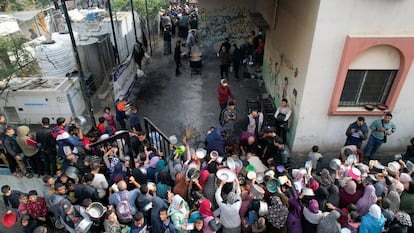
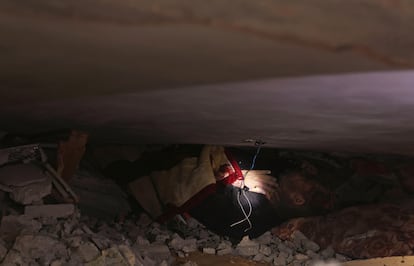
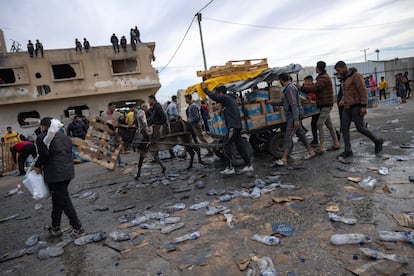
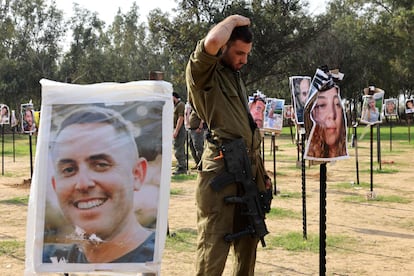
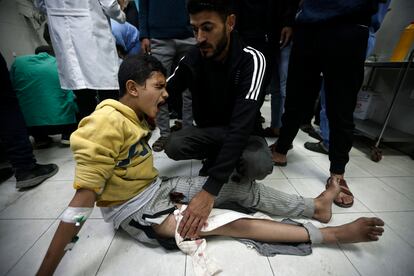
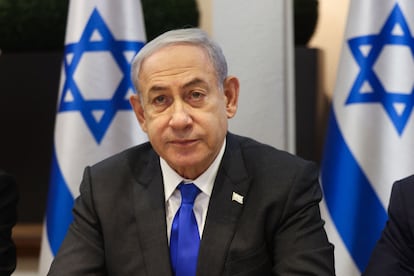
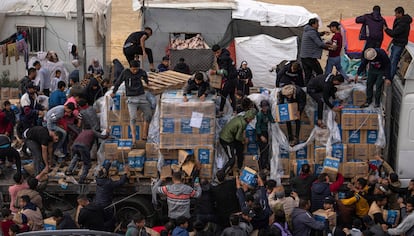
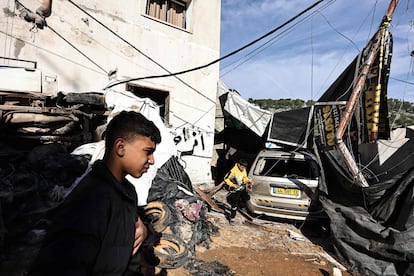
Changing positions
But Netanyahu is not just being pressured by parties in his own country. Two of his European allies, the United Kingdom and Germany, have changed their stances on the conflict, abandoning their position against a truce to call for one, albeit with nuances. On Sunday, British Foreign Secretary David Cameron and his German counterpart Annalena Baerbock published an article in The Sunday Times calling for “a sustainable ceasefire” in Gaza. The proposal represents a change in position; until now, both governments only advocated “humanitarian pauses.” They also called on Israel to respect international humanitarian law, arguing that “too many civilians have been killed.”
For his part, U.S. Defense Secretary Lloyd Austin is visiting Israel and other countries in the region. The aim of his trip, according to Washington executive sources quoted by The New York Times, is to convince Netanyahu to abandon his large-scale air and ground campaign in Gaza. The Biden administration wants to persuade Israel to move to a new phase of the conflict in which elite forces make targeted incursions into the Gaza Strip to fight Hamas’s leadership surgically and selectively, to avoid the enormous toll of civilian casualties so far.
But France has been the most adamant in its criticism, condemning Wednesday’s Israeli bombing of a residential building in Rafah, in the south of the Gaza Strip, which killed a French Foreign Ministry worker. Emmanuel Macron’s government has demanded that Israel explain the attack “in the shortest possible time.” On Sunday, Catherine Colonna, the head of the ministry, met with her Israeli counterpart Eli Cohen. She called for “a new, immediate and lasting truce. Too many civilians have been killed,” Colonna said. For his part, Cohen replied that a ceasefire would be “a mistake and a gift to Hamas.”
Looting trucks
Meanwhile, the situation in Gaza continues to deteriorate rapidly. A lack of the most basic supplies has caused a desperate situation for residents. On Sunday, dozens of Palestinians looted some of the trucks loaded with humanitarian aid that have entered the Gaza Strip through the Rafah crossing, on the Egyptian border. Israeli bombing continued into the early hours of the morning; according to Gaza Strip authorities, at least 40 people were killed in the Jabalia refugee camp in the north and in Deir al-Balah.
The Israeli army has said that it has taken control of the town of Khan Yunis and asked the inhabitants to move west, calling the area a combat zone. In addition to the aid entering through Rafah, the Israeli government has opened the Kerem Shalom crossing to allow access for more trucks. Until now, this Israeli post was only used to inspect supplies, but the vehicles had to return to Egypt to enter from there, creating a huge bottleneck.
The Israeli Defense Forces also said that they just discovered the largest tunnel that Hamas has built in the Gaza Strip. According to the Israeli army’s X (formerly Twitter) account, from its entrance just 400 meters (about a quarter of a mile) from Erez, the main passage for people between Gaza and Israel, the tunnel extends for about four kilometers (about 2.5 miles) underground. The press service reported that the subterranean gallery was Mohammed Sinwar’s project. He is the brother of the Hamas leader in that territory, whom Israel alleges was the mastermind behind the October 7 attacks.

On Sunday, violence also hit the West Bank. Five people were killed in an Israeli drone strike on the Nur Shams refugee camp in Tulkarem in the northern West Bank, where dozens of Israeli raids have taken place since the October 7 Hamas attacks. In this Palestinian National Authority-controlled area, the bombing brings the death toll from violent incidents with the Israeli army to 500 so far this year, the highest since 2002, during the Second Intifada.
Sign up for our weekly newsletter to get more English-language news coverage from EL PAÍS USA Edition
Tu suscripción se está usando en otro dispositivo
¿Quieres añadir otro usuario a tu suscripción?
Si continúas leyendo en este dispositivo, no se podrá leer en el otro.
FlechaTu suscripción se está usando en otro dispositivo y solo puedes acceder a EL PAÍS desde un dispositivo a la vez.
Si quieres compartir tu cuenta, cambia tu suscripción a la modalidad Premium, así podrás añadir otro usuario. Cada uno accederá con su propia cuenta de email, lo que os permitirá personalizar vuestra experiencia en EL PAÍS.
¿Tienes una suscripción de empresa? Accede aquí para contratar más cuentas.
En el caso de no saber quién está usando tu cuenta, te recomendamos cambiar tu contraseña aquí.
Si decides continuar compartiendo tu cuenta, este mensaje se mostrará en tu dispositivo y en el de la otra persona que está usando tu cuenta de forma indefinida, afectando a tu experiencia de lectura. Puedes consultar aquí los términos y condiciones de la suscripción digital.








































